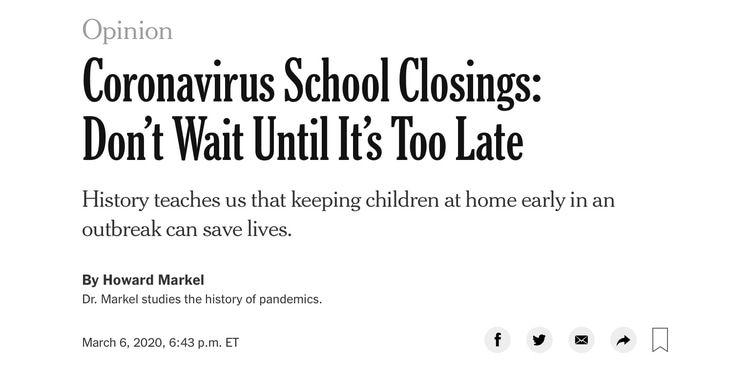
By Steve Sailer
03/06/2020
From The New York Times opinion page:
Coronavirus School Closings: Don’t Wait Until It’s Too Late
History teaches us that keeping children at home early in an outbreak can save lives.By Howard Markel
Dr. Markel studies the history of pandemics. Dr. Markel is the director of the Center for the History of Medicine at the University of Michigan and a professor of pediatrics.March 6, 2020, 6:43 p.m. ET
My research on the long history of epidemics has taught me that when it comes to outbreaks of contagious respiratory infections, closing schools can help prevent many thousands of illnesses and deaths.
Schools are community gathering places where large numbers of people are in proximity to one another and respiratory infections can easily spread among young people and adults alike. Shutting them down can be a key part of slowing the spread of easily transmissible viruses so that hospitals are not overrun with sick people, and it can help to buy time to allow for the development of antiviral medications, medical treatments or a vaccine.
But policymakers working to stop the spread of the coronavirus that causes Covid-19 should remember a key part of this historically informed equation: We can’t wait until it’s too late.
Communities in the United States must shut down schools before, not after, the outbreak becomes widespread here. “Widespread” is admittedly an imprecise term, but I use it to describe a situation in which there are multiple cases throughout a town or state and more cases with each passing day.
In 2007, my colleagues and I at the University of Michigan Center for the History of Medicine and the U.S. Centers for Disease Control and Prevention studied the 1918-19 influenza pandemic, which killed up to 750,000 Americans.
We looked at 43 large cities that carried out some combination of non-pharmaceutical interventions (NPIs): isolating the ill or those suspected of being ill in hospitals or at home; banning public gatherings; in some cases, shutting down roads and railways; and closing schools.
School closing turned out to be one of the most effective firewalls against the spread of the pandemic; cities that acted fast, for lengthy periods, and included school closing and at least one other NPI in their responses saw the lowest death rates.
Of course, all NPIs are socially disruptive and should be used only as a last resort, to control infections that are highly transmissible and dangerous, and have high fatality rates. The primary problem with the new coronavirus is that we have never before experienced an outbreak with it, so we do not yet have good, stable numbers to tell us how serious it is.
The thing about school closings is that if this somehow turns out to be a false alarm, or if the trouble is over by, say, Memorial Day, we can just extend the school year later into spring or summer the way that school districts routinely respond to strikes, blizzards, smoke from brushfires, and other causes of school closures.
This is a content archive of VDARE.com, which Letitia James forced off of the Internet using lawfare.